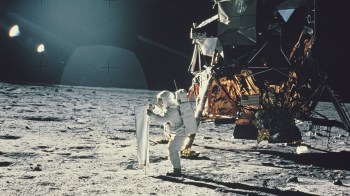New chip could change electronics
TEXT OF INTERVIEW
Bob Moon: We’ll admit it: The computer news we’re about to bring you is kinda nerdy, but it could also be hugely important.
Scientists at Hewlett Packard announced they’ve come up with new technology for computer chips. And they say it’ll revolutionize how our electronics will work in the future.
They’re called memristors, and they could change the way we use computer chips. Think fast. And think small. As in, microscopic.
To help us break this down, we have Wall Street Journal’s Deputy San Francisco Bureau Chief and technology writer Don Clark. Good to have you with us.
DON CLARK: Thank you.
Moon: So I know this about computer chips: they’re magical and they make my computer run, but remind us what they do to make that happen?
CLARK: Computer chips are a shrinking of all those old components they used to have in the old days, like tubes and transistors, and basically they do all the things you want any electric device to do: to store information, to do calculations, to add numbers together and run software, and all those kind of great things. And so what the electronics industry tries to do is to make those things better and better, and faster and faster, and cheaper and cheaper each year.
Moon: And I’m assuming that HP’s new technology is going to do something different, what is that?
CLARK: Basically as companies try to shrink the circuitry inside computer chips, there were fears that they would stop being able to do so at a certain point and those devices we all love would stop getting better. So this memristor, this device that combines memory and resistance is kind of a new way to keep that progress going, to keep shrinking that circuitry and making it faster and cheaper and use less energy.
Moon: Now I understand that fundamentally there’s a physical limit to just how small you can get. How small are we getting here?
CLARK: The little elements in chips today are around 30-50 nanometers. That’s billionths of a meter. Now they fabricated these little memristors small as just three of those. So it’s about a tenth of the size of anything that people are using today, and it could get even smaller.
Moon: Now what does that mean for storage? I remember when I was impressed I could put a dozen songs on a thumbnail-sized chip. Now I can fit almost my whole music collection on a chip half that size. What’s next?
CLARK: Well, exactly. It’s going to get better and better. But the problem was people were thinking that you could just stop shrinking at a certain point, so this will keep the shrinking going for quite a while longer. And the other thing that HP found is that these things not only can store information, but they can also do calculations. It helps ensure that those technologies keep getting faster and smaller, too.
Moon: So what does this mean for the companies that produce this technology?
CLARK: Well, it means that they don’t have to worry about having to go get into some other business. That eventually there should be a way to keep the pace of innovation going.
Moon: What changes do you think we’re likely to see in our electronic gadgets as a result of this technology?
CLARK: There are several ways this could go. This could help make a device like the iPad, say, a lot less expensive. That’s one direction it could go. It could make something like that a lot smaller. It could make something like that use a lot less electricity. Or it could make it much, much more powerful, and it kind of depends on what the designer wants to do to get the desired effect.
Moon: You mentioned power. I’m wondering does that mean that if you’re dealing with atomic-sized particles, it takes a lot less power to move them around. Are we going to see a lot longer battery life? You could have a cell phone, say, that only needed charging, say, once a month.
CLARK: Yes, I think that’s one of the implications of this technology. You could decide to have about the same performance today and just keep reducing the power consumption, so that they can last hours and hours and weeks and months.
Moon: Don Clark is Deputy San Francisco Bureau Chief and a technology writer for the Wall Street Journal. Thanks for joining us.
CLARK: Thank you.
There’s a lot happening in the world. Through it all, Marketplace is here for you.
You rely on Marketplace to break down the world’s events and tell you how it affects you in a fact-based, approachable way. We rely on your financial support to keep making that possible.
Your donation today powers the independent journalism that you rely on. For just $5/month, you can help sustain Marketplace so we can keep reporting on the things that matter to you.


















